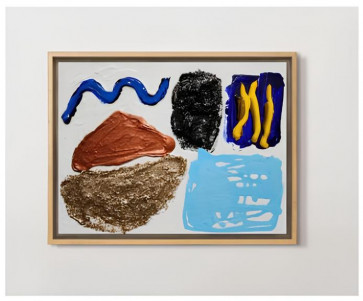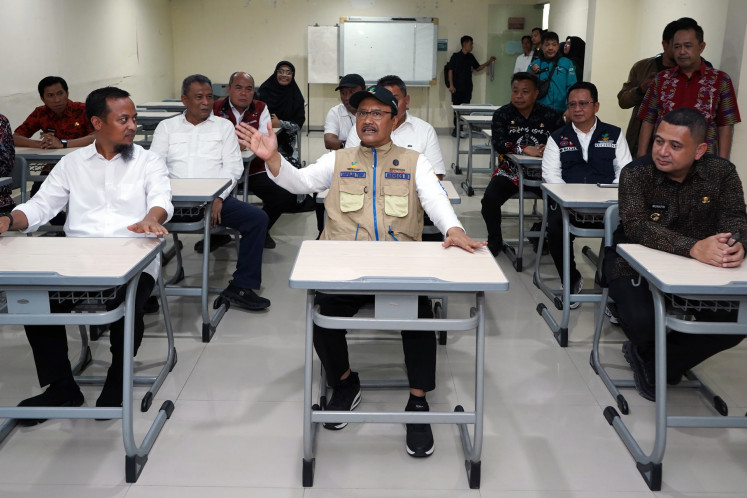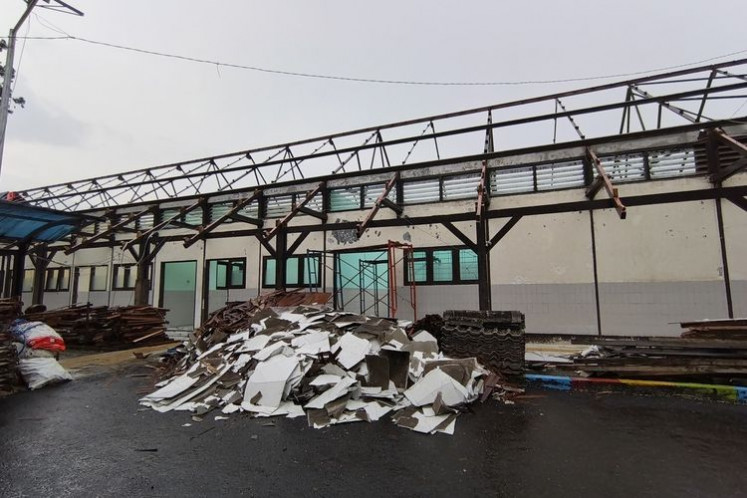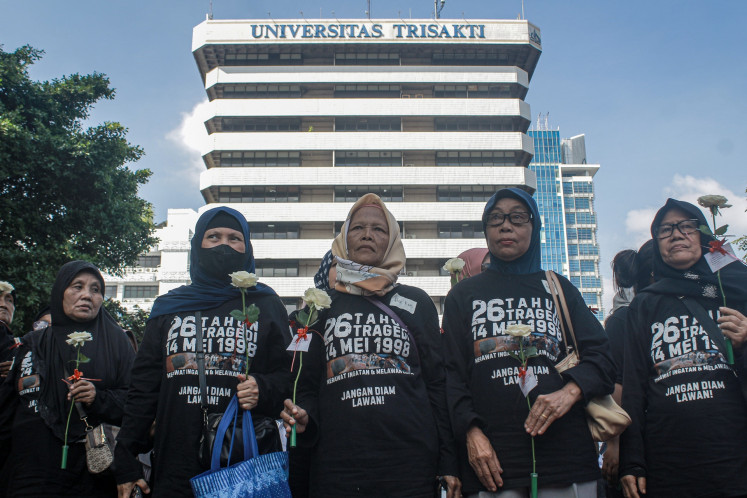Does the EUDR constitute environmental espionage?
Farmers, including millions of small farmers who live in the mountains across the Global South, should all buy smartphones and geotag their farms, which will naturally include their houses and huts, and send them to EU officials.
Change text size
Gift Premium Articles
to Anyone
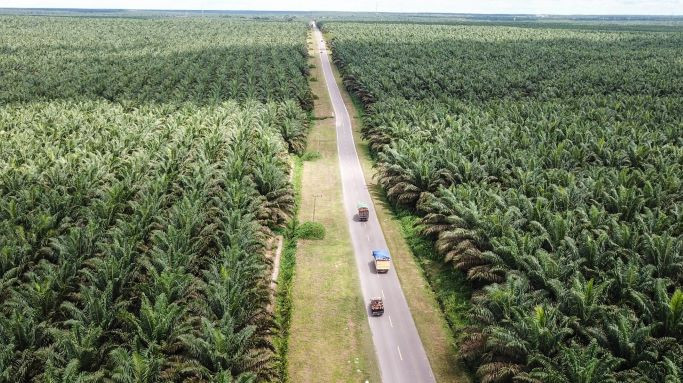
T
he European Union Deforestation-Free Regulation (EUDR) is the new EU tool claimed to address deforestation by imposing its unilateral rule that obliges companies importing certain goods to certify that products they brought into the EU are not linked to deforestation after a cutoff date of Dec. 31, 2020.
Those targeted products are not farmed in the EU such as coffee, cocoa and rubber, and also happen to be products that are in direct competition with the EU’s own products such as beef, soya, palm oil and timber products. The EUDR has also successfully excluded its own degraded and destroyed millions of hectares of peatlands emitting massive pollution, unabated and unchallenged.
It has been known that rewetting all EU peatlands is political suicide and runs counter to the very basic purpose of EU farming subsidies: farming jobs and political votes.
Clearly, the EUDR is about how to force other nations, especially in the Global South, including Indonesia, to follow EU rules to protect their own products and is not about the real concern of the environment. Because if it is a genuine concern about the link between farming and environmental degradation, EU farming on drained and degraded peatlands should be included in this regulation.
On how to implement the EUDR, the EU unilaterally imposes an obligation of origin-tracing by using geolocation data of where the products are farmed. This means that farmers, including millions of small farmers who live in the mountains across the Global South tending their Arabica plantation, should all buy smartphones and geotag their farms which will naturally include their houses and huts, and send them to EU officials.
This also means that regardless of the existing laws and regulations of data privacy in any exporting countries, the farmers of those countries are forced by the EUDR to surrender their privacy of properties and homes to be known, processed, verified, and thus inspected by the EU.
Meanwhile, the EU itself has very strict rules on geotagging and data privacy. As a matter of fact, Articles 7 and 8 of the EU Charter of Fundamentals provide the legal basis for respect for private life and for the protection of personal data. The landscape of EU data protection across the continent is built upon these “indivisible, universal values,” and are essentially made up of two different EU privacy laws: the e-Privacy Directive (ePD) and the General Data Protection Regulation (GDPR).
These EU privacy laws regulate how data is allowed to be collected, processed and stored. They empower individuals within the EU with certain rights, e.g. the right of prior consent before having their data processed, the right to access their collected data, and the right to the erasure of their collected data.
Clearly, forcing foreign farmers to surrender their data privacy to the EU is a violation of fundamental human rights, even with the EU’s own standards. The EUDR does not provide legal rights such as a right of erasure.
Location data is not only a personal matter but also has national security implications. Take the case of Strava, my favorite cycling and running app.
In 2018 Strava heatmap showed sensitive information about the location of remote Western military bases by mapping soldiers jogging around the perimeter and of one particular suspected missile command in Asia. They shared their jogging and sporting activities without realizing the strategic implications. Immediately Strava responded to this strategic concern and eventually changed the original version of the heat map.
Just imagine the collection of data location of millions of hectares of foreign lands in the database of the EU, which is undoubtedly priceless for various purposes. This data can be used for military operations or other strategic activities. This is not a far-fetched conspiracy theory, but an extension of existing facts of environmental espionage.
The so-called Eco-Spy Project used data from Cold War spy photography taken by United States CORONA spy satellites during the Cold War as sources for environmentalists in Europe. The head of MI6 revealed that the British intelligence service has started a program called “green spying” to monitor industrial countries’ emissions. The New York Times had a special report about Linda Zall, a former CIA analyst, telling the story of a “highly classified struggle to put the nation’s spy satellites onto a radical new job: environmental sleuthing.”
With existing capabilities of monitoring satellites for spying or other purposes combined with the forced surrendering of data location from millions of farmers around the world, the EU will really have a high-level ability to create a real-time landscape of properties with high precision across the world. The sky is the limit as to the usage of this data.
The EUDR does not provide a legal basis for the protection of data privacy of millions of hectares from foreign farmers, and this data is at risk of arbitrary use by the EU, including selling it to a third party or sharing it with different countries for many purposes, including intelligence. In addition, it is also not a secret that from various media reports, many EU individuals in official capacities are involved in being double agents such as the case of Walter Biot of Italy and an Austrian colonel, Polish energy official, Bulgarian defense official, or Latvian rail worker.
In sum, data surrendered by millions of farmers across the world are in harm’s way of being shared, sold or stolen for various strategic purposes that the farmers themselves have no knowledge of its implication. It would be extremely stupendous for Arabica farmers in the mountains of Aceh, Ethiopia and Colombia, for instance, to understand that surrendering the geolocation of their farms and houses’ locations will have national security implications.
The EUDR has more misadventures requiring wider and deeper analysis such as the cost implication for small farmers to implement the EUDR, the fact that on timber products EU will create three standards (FLEGT-VPA, the EUDR and private voluntary standards, such as FSC and PEFC, that practically monopolized global timber standards with their strong capital power).
There is however a larger implication of this regulation that runs counter to even EU values and principles, namely what does the EU actually want to state its position in the current global geostrategic shift.
Realizing that the Global South and its smallholder farmers are being targeted by the EUDR, the nagging question is: Does the EU want to recolonize them again with different ways and means while wanting to decouple from China, and seek to make a new policy shift to Russia as well as want to have strategic independence from the US in foreign, defense and strategic policy?
Trust in international relations is very elusive and is the basis of cooperation among equals. And knowing that the EUDR is illegal and can be used for espionage, the EUDR endangers trust-building between the EU and the Global South. Not to mention the smack of colonialism flavor that continues to shine from Europe since so many moons ago.
***
The writer is a Harvard Law School graduate, and president of the 20th State Parties Conference of UNCLOS 1982.



